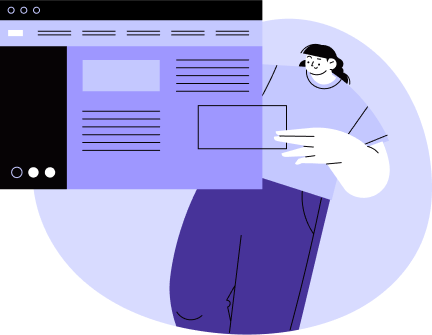Business
15 AI Business Ideas in Australia for 2025 and Beyond
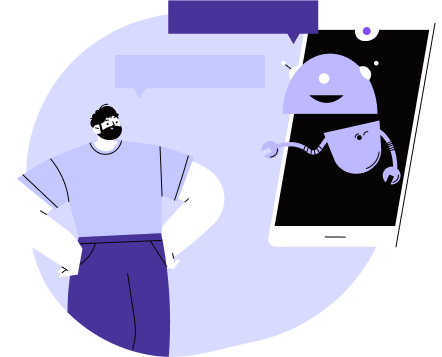
- AI-powered AgriTech, personalized healthcare, and retail inventory tools
rank among the most profitable AI business ideas in Australia. - Generative AI marketing, legal document automation, and AI-driven chatbots
help businesses scale faster and serve customers better. - Renewable energy management, bushfire prediction, and real estate market analysis
present high-impact opportunities for local innovation. - Targeting niche sectors with tailored AI solutions enables quick market entry,
faster adoption, and strong long-term growth potential.
The future of businesses in Australia is being rewritten by a single force: artificial intelligence. While some still see AI as a distant buzzword, it’s already reshaping industries from the ground up. We see it on the dashboards of farmers optimizing crop yields, in the back-end systems of retailers managing inventory, and in the boardrooms of major banks. This isn’t just about using a new tool; it’s about building a new business model entirely. The next wave of winners will be those who seize this moment.
Australia is standing at a rare inflection point. From bushfire prediction platforms to hyper-personalized marketing engines, the playing field is wide open for founders who can match AI’s capabilities with Australia’s most urgent challenges and untapped opportunities.
This isn’t about chasing every shiny new technology—it’s about picking the right battles to fight. In the next few minutes, you’ll see 15 AI business ideas built specifically for the Australian market. Each one is rooted in solving real problems, scaling quickly, and creating measurable impact. The opportunity is here. The question is—are you ready to build on it?
Atlassian co-founder Scott Farquhar spoke directly about this recently, saying, “We’re entering the next energy revolution, but this time using energy to power knowledge work.” These aren’t empty words. They’re a push to act now. Success means looking past all the noise and finding practical, lasting AI business ideas in Australia that fix real problems for Australian customers and companies.
Bonus Read: AI in Australia (A Practical Guide)
Don’t Wait for the Future. Build It.
We partner with visionaries like you to turn raw potential into profitable businesses.
Australia’s AI Moment: The Market Landscape and a Call for Action
The future of AI businesses in Australia is looking brighter than ever, with significant growth and investment on the horizon. Australia’s AI market hit USD 2,072.7 million in 2024. IMARC Group projects the market will grow to USD 7,761.0 Million by 2033, showing a (CAGR) of 15.17% from 2025-2033.

Scott Farquhar (Australian businessman and former CEO of Atlassian), gave a speech at the National Press Club where he warned that Australia might end up just buying AI products from other countries instead of making our own. This would happen if we don’t spend enough money on research, building the right infrastructure, and making good policies.
He said Australia has a real shot at winning in the global AI competition, especially since we could become a major place for data centers. Even though the numbers look good, there are still some big challenges with Aussie AI startups we need to fix. Things like not having enough skilled people, small companies struggling to get money, and arguments about who owns what ideas.
The good news is that programs like government grants for AI businesses in Australia through the AI Adopt Programme are trying to help fix these problems. They give money and support to people who want to try new things. With the right help and smart planning, AI startups in Australia could do really well.
This is why having a clear plan and good AI startup ideas in Australia matters so much. Here are 15 business ideas that make sense for our specific market.
15 Strategic AI Business Ideas for the Australian Market for 2025 and Beyond
Australia’s rapidly growing AI landscape presents abundant opportunities for entrepreneurs who know where to look. From revolutionizing industries to enhancing customer experiences, AI-driven businesses show vast potential. This guide goes beyond the general buzz to highlight specific, high-impact concepts. We’ve curated 15 strategic AI startup ideas in Australia, where each concept targets a proven market need in sectors like precision agriculture, personalized healthcare, and intelligent logistics.
Bonus Read: How AI Impacts Your Business Domain
AI-Powered Agri-Tech for Precision Farming
The Concept: Build an AI app/platform combining satellite images, IoT sensors, and ground monitoring to track soil health, forecast crop yields, and control irrigation systems for Australian farms. The platform can deliver live data on pest problems, nutrient needs, and farm conditions, giving farmers complete visibility into their operations. Australia’s huge farming industry makes this a realistic opportunity among promising AI business ideas to launch in Australia.
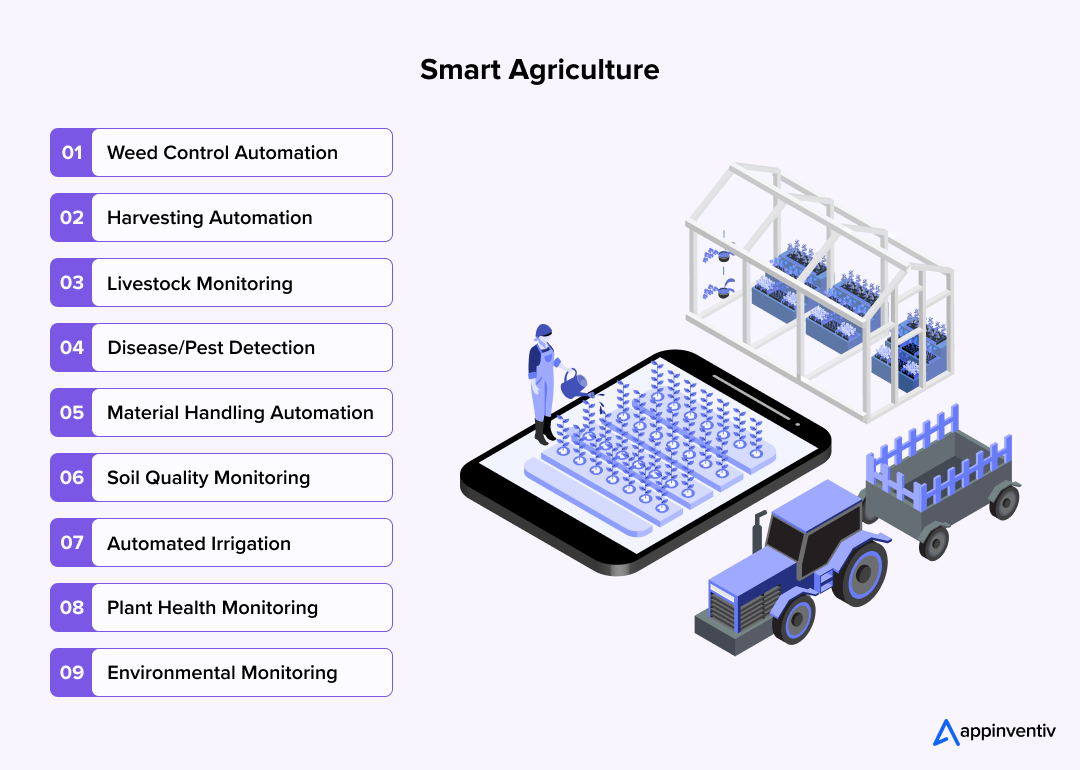
Better Resource Use and Higher Profits: AI transforms the sector hit hard by climate shifts and weather uncertainty. Smart resource management—water and fertilizer optimization—boosts both profits and environmental sustainability for Australian farmers. AgriWebb shows what’s possible here, a local company using digital tools to help livestock farmers run their operations more effectively.
AI-as-a-Service Model for Hyper-Personalized Marketing Campaigns
The Concept: Build a service using AI to create custom marketing content—email headlines, ad text, social posts—for small and medium businesses. The platform studies customer behavior to find the best messages and channels, then automatically creates and sends targeted campaigns. This ranks among the most practical and valuable AI startup ideas in Australia.
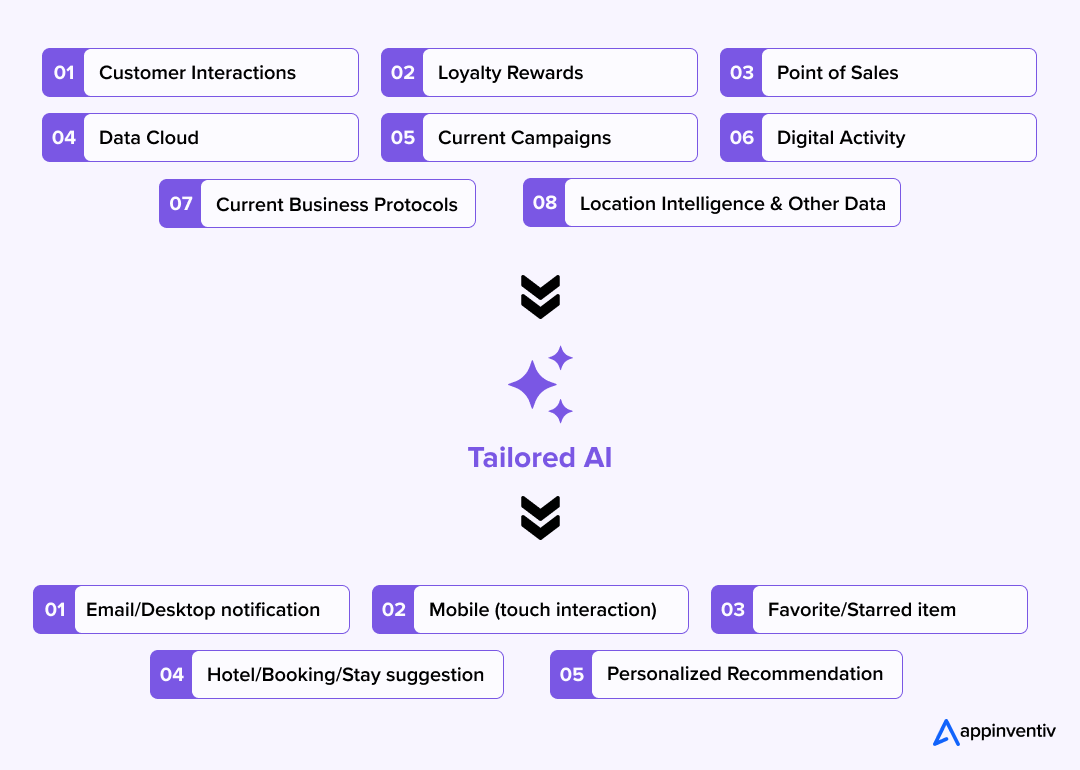
Growing Customer Connections: Most small Australian businesses can’t afford big marketing teams. This AI-as-a-Service model offers an affordable way to create engaging, brand-consistent content quickly, helping them compete with bigger companies. Cuttable (an Australian AI-powered advertising platform) uses AI-as-a-Service to automate personalized ads, optimize content in real-time, and segment audiences. It enhances customer connections through consistent, data-driven engagement across digital channels, boosting loyalty and campaign performance.
Must Read: Generative AI for Businesses
AI-Driven Supply Chain Optimization for Logistics
The Concept: Create an AI supply chain system that spots delivery problems early, finds better routes, and tracks inventory live for Australian companies. The platform learns from changing conditions—traffic jams, weather shifts, customer demand spikes—to keep goods moving smoothly and cheaply. This stands out as a high-impact opportunity among promising AI business ideas in Brisbane, Australia’s logistics center.
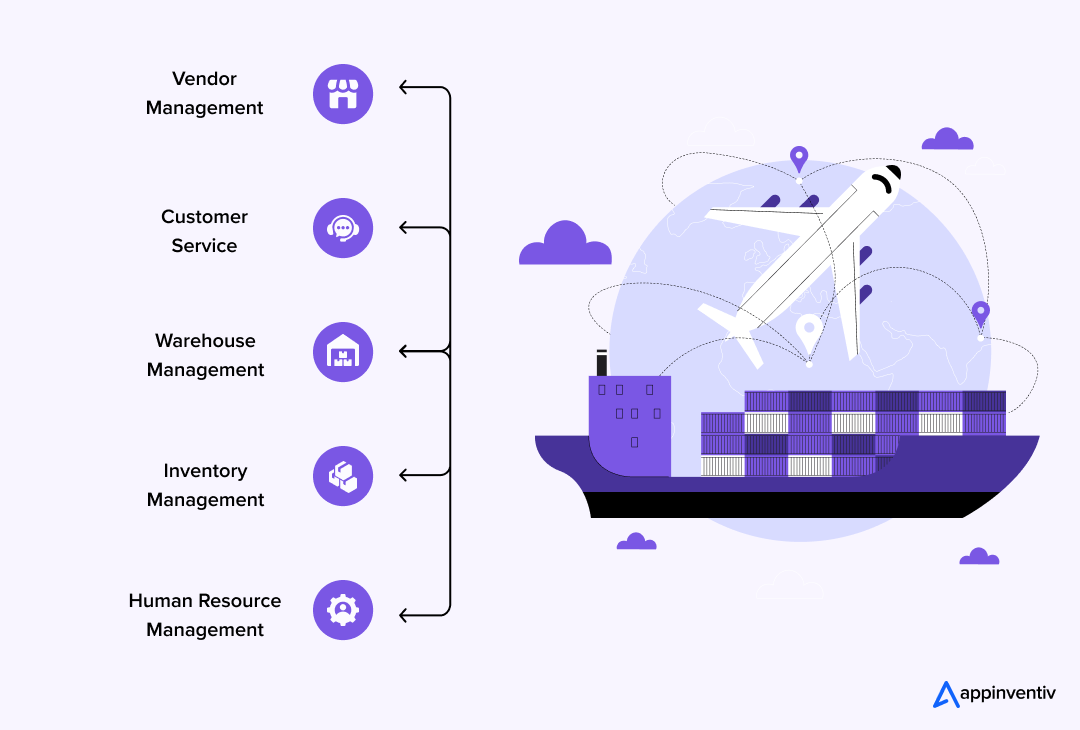
Lower Costs and Stronger Operations: Australia’s huge distances make shipping complex and expensive for businesses. AI can simplify these challenges, helping companies slash fuel bills, speed up deliveries, and handle unexpected problems better. Yusen Logistics shows this works—they use AI systems to give clients live tracking and supply chain data.

Bonus Read: AI in Supply Chain Analytics
AI for Bushfire and Natural Disaster Prediction
The Idea: Build a smart computer system that helps predict bushfires and other natural disasters. This system would look at old weather records, current weather patterns, and pictures from space satellites to figure out where fires might start and which way they’ll spread. Government teams and firefighters would get early warnings so they can get ready and take action faster. This could save lots of lives and stop millions of dollars’ worth of damage to homes and businesses. This is one of the most important AI business ideas to launch in Australia because it actually helps protect people.

Averting Catastrophe and Protecting Communities: Bushfires and floods happen over and over again in Australia, and they cause terrible damage every time. A smart computer system that can predict these disasters could give the government and local towns important early warning. This would help save people’s lives and protect valuable resources. The idea of a smart “computer satellite” like DeepMind’s AlphaEarth shows how this kind of system could study and predict dangerous weather events around the world.
AI-Powered Legal Document Automation
The Idea: Create a SaaS platform that uses AI to draft, review, and analyze legal documents, from contracts to terms of service. This system could also flag potential compliance risks and suggest amendments based on local legal precedents, significantly reducing the time and cost associated with legal work. This is among the many strong AI business ideas in Sydney, home to many of the country’s top law firms.
Democratizing Legal Services: Legal services can be prohibitively expensive for startups and small businesses. This kind of platform democratizes access to legal support by automating routine tasks, making legal compliance more affordable and efficient. An example of this is the startup August, which builds AI tools to automate document-heavy legal work, proving that this model is gaining traction globally.
Must Read: 10 Use Cases of AI in the Legal Industry
AI-Based Cybersecurity for SMEs
The Idea: Offer a cybersecurity service with AI that uses machine learning to detect and neutralize threats in real time for small and medium-sized enterprises. This solution would go beyond simple firewalls by using behavioral analytics to spot unusual activity and automatically respond to a wide range of sophisticated threats. This is a fantastic example of a profitable business idea for artificial intelligence.
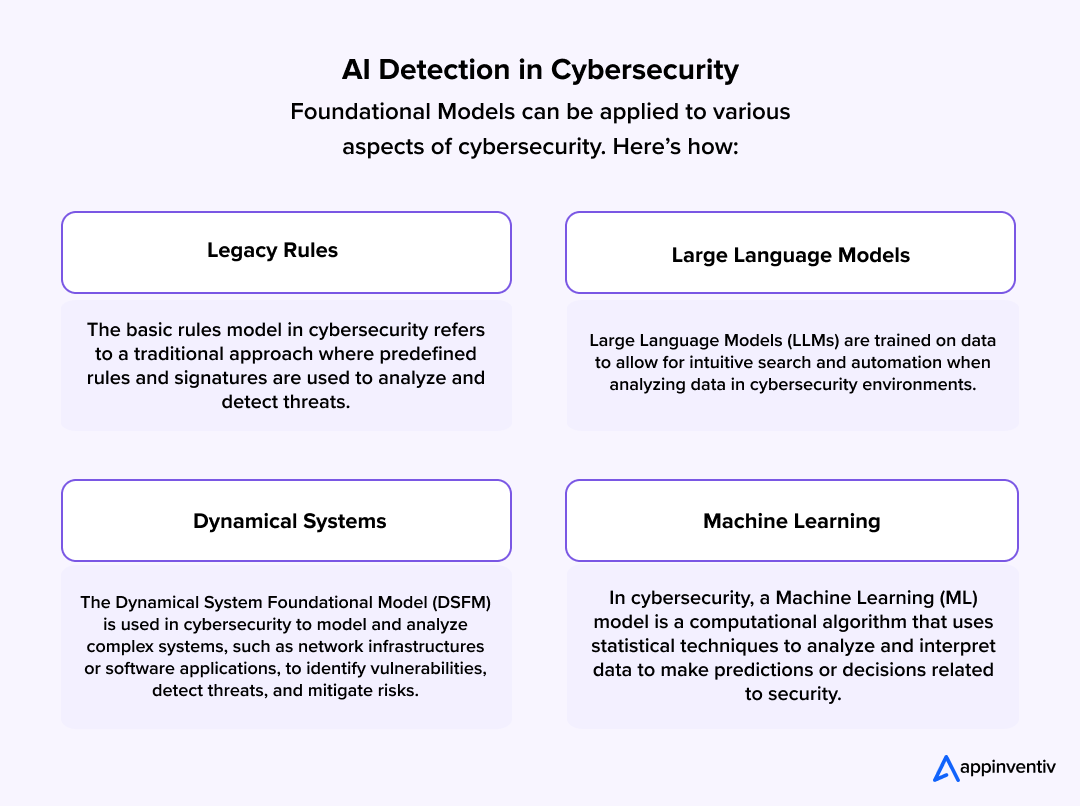
Fortifying Australia’s Digital Economy: Cyberattacks are a growing threat, and SMEs often lack the resources to defend themselves effectively. An AI-powered solution provides an affordable, proactive defense mechanism that can identify zero-day attacks and sophisticated threats, protecting a vulnerable but vital part of the Australian economy. A local example of this is the Australian Industry Group (Ai Group), which offers AI-powered cybersecurity consulting and training services specifically to assist SMBs.
AI for Personalized Healthcare and Wellness Plans
The Idea: Develop an AI application that creates personalized health and wellness plans based on a user’s health data, lifestyle, and even genetic information. The platform would act as a digital health coach, monitoring progress, offering motivational support, and adjusting plans in real time to meet evolving needs. This is one of the most promising AI startup ideas in Australia.
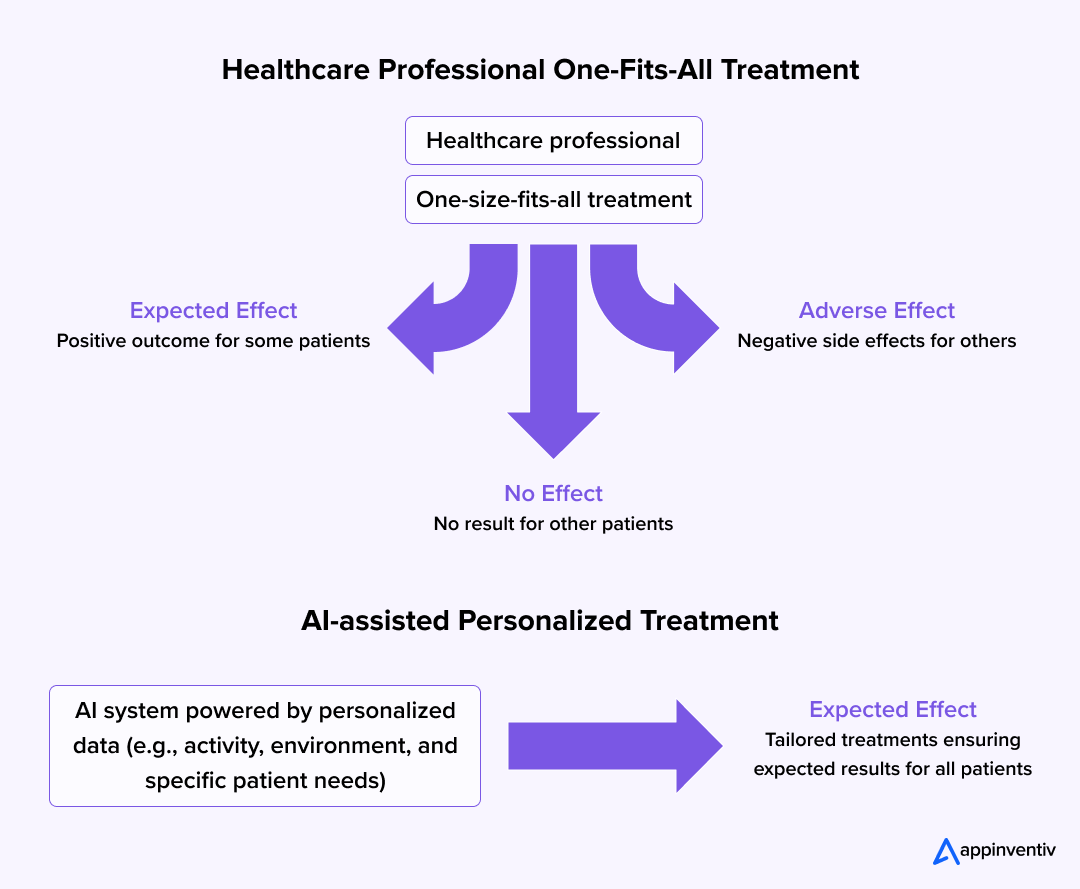
A Proactive Approach to Health: With an aging population and a growing focus on preventative health, there’s a huge market for personalized healthcare solutions. This kind of application for AI in healthcare for Australia empowers individuals to take control of their health, potentially reducing the strain on the public healthcare system. While many companies operate in this space, the broader trend is exemplified by how platforms are leveraging AI to provide tailored patient care and predictive analytics to improve health outcomes.
AI-Driven Retail Inventory Management
The Idea: Build an AI system that predicts consumer demand and automates inventory management for Australian retailers, particularly in popular hubs like Melbourne. This system would analyze sales data, social media trends, and even local weather forecasts to provide highly accurate predictions, ensuring stock levels are always optimized. This is an ideal idea among the many AI business ideas in Melbourne, a city with a thriving retail and fashion scene.

Maximizing Profit and Minimizing Waste: Retail is a fast-paced and competitive industry. AI can help businesses minimize stock-outs, reduce overstocking, and make data-driven decisions on purchasing and promotions. This leads to increased profitability and happier customers. Globally, giants like Amazon and Woolworths use AI for demand forecasting and inventory management, demonstrating the proven value of this model for Australian retailers.
AI for Real Estate Market Analysis
The Idea: Create an AI platform that analyzes vast amounts of real estate data—including sales histories, property features, zoning laws, and local amenities—to predict property values and identify market trends. The platform could also assist in generating 3D models of potential developments, dramatically shortening the early feasibility phase. This is one of the many innovative AI business ideas in Perth, where the real estate market is highly dynamic.

Smarter Development and Investment: The Australian real estate market is notoriously complex. An AI-powered tool can provide a level of data analysis that human agents and planners can’t, offering a significant advantage for buyers, sellers, and developers. A great example of this is the NSW Government’s “AI in Planning” initiative, which uses AI to pre-screen development applications, saving time and increasing efficiency for councils and builders.
Related Read: AI in Real Estate
AI-Powered Customer Service Chatbots
The Idea: Develop a specialized AI-powered customer service platform that provides and customizes AI-powered chatbots for businesses, particularly for customer service inquiries. These advanced chatbots would use natural language processing to understand complex queries and provide human-like responses, seamlessly escalating issues to human agents only when necessary.

Delivering 24/7 Support and Boosting Efficiency: Many Australian businesses, particularly in e-commerce and services, struggle to provide 24/7 customer support. An AI chatbot can handle a large volume of routine queries, freeing up human staff to handle more complex issues and providing customers with instant, round-the-clock support. Local company AI Chatbot Australia is a prime example, providing custom solutions that have reduced administrative workloads for their clients.
AI for Sustainable Urban Planning
The Idea: Build an AI platform that assists urban planners in Australian cities by simulating the impact of new developments on traffic, resource consumption, and environmental factors. The tool could also analyze public feedback from consultation documents to identify key community concerns quickly and efficiently. This is a key AI tech startup idea for Australian market 2025 due to its amalgamation of sustainability, combined with the modern tech landscape.
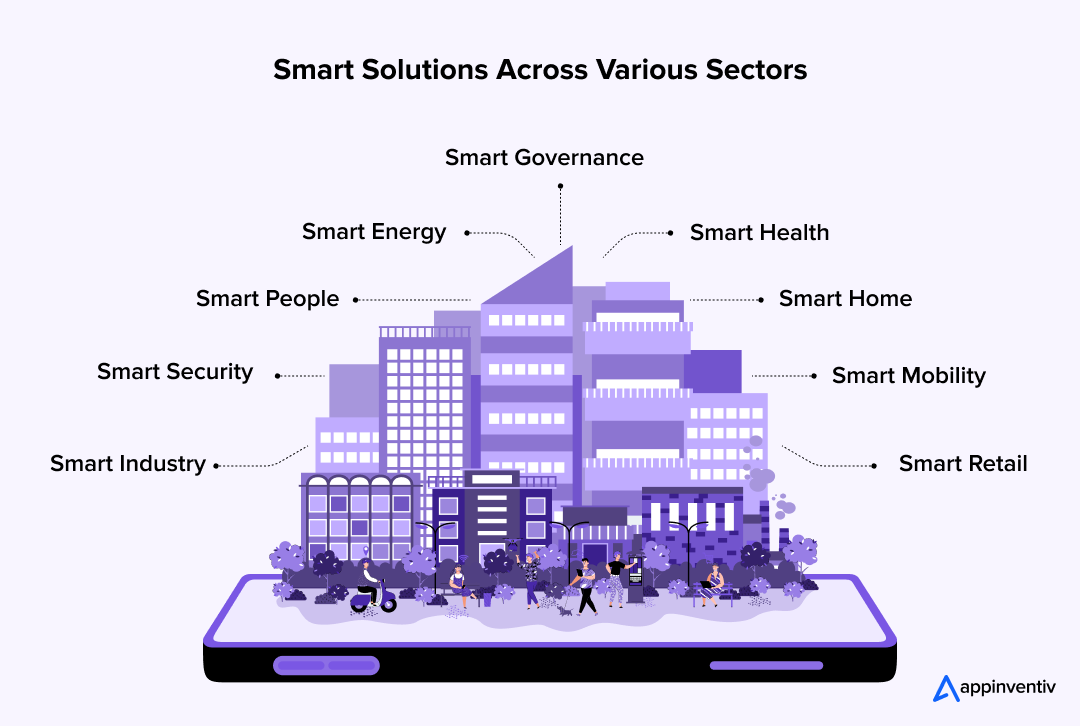
Creating Smarter, Greener Cities: Australia’s major cities are growing rapidly, and sustainable development is a top priority. This tool can help planners make smarter, data-backed decisions that lead to more livable, efficient, and environmentally friendly urban spaces. A research project at the University of Waikato has demonstrated how AI can analyze thousands of public submissions on planning proposals in a matter of hours, a task that would take human planners weeks.
AI for Talent Acquisition and HR Automation
The Idea: Launch an AI-driven platform that automates the recruitment process by screening resumes, identifying qualified candidates, and even conducting initial interviews using conversational AI. The platform with AI in HR would help businesses of all sizes to reduce unconscious bias and make data-driven hiring decisions. This is one of the more impactful AI business ideas in Australia.
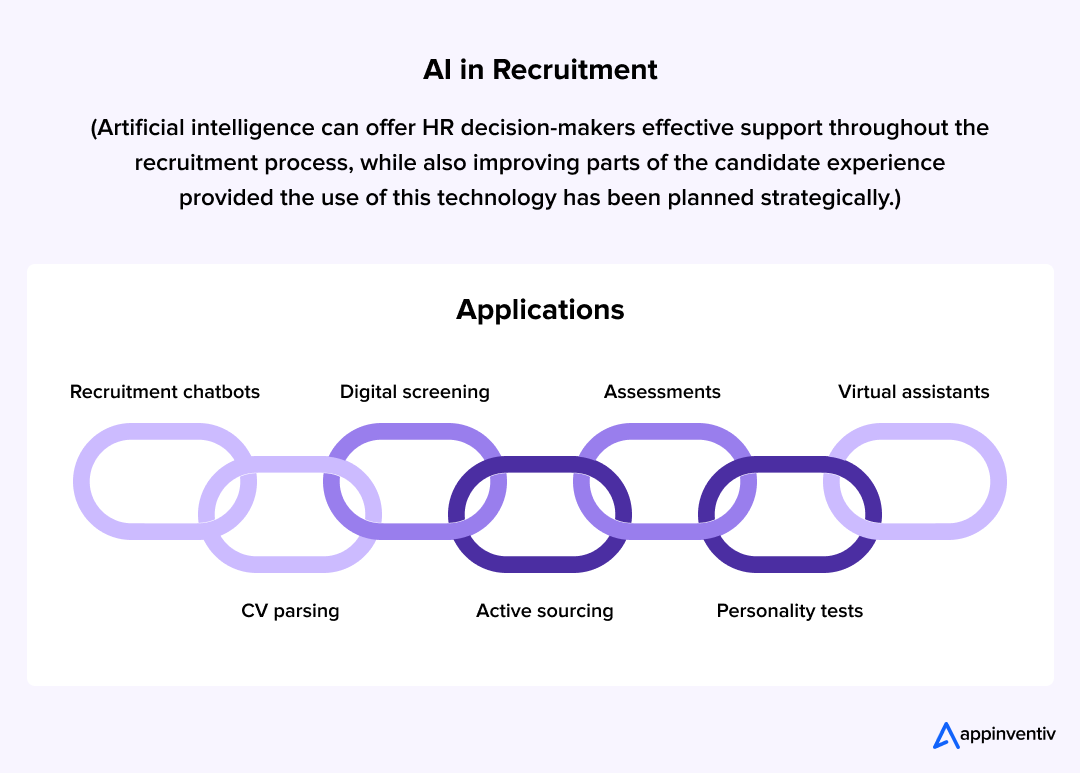
Finding the Right People, Faster: The Australian job market is tight, and finding the right talent can be a major challenge. This solution helps businesses streamline their hiring process, reduce unconscious bias, and find the best candidates more efficiently. Companies like iSmartRecruit offer AI-powered talent acquisition software with features like resume parsing and candidate matching, demonstrating the commercial viability of this idea.
Innovative AI Solutions for Renewable Energy Management
The Idea: Develop an AI system that optimizes energy distribution and storage for residential and commercial properties using renewable sources like solar panels. This system would predict energy needs and weather patterns to maximize the use of solar energy and minimize reliance on the grid, helping users save money and reduce their carbon footprint. This is one of the most innovative Australian AI business ideas.
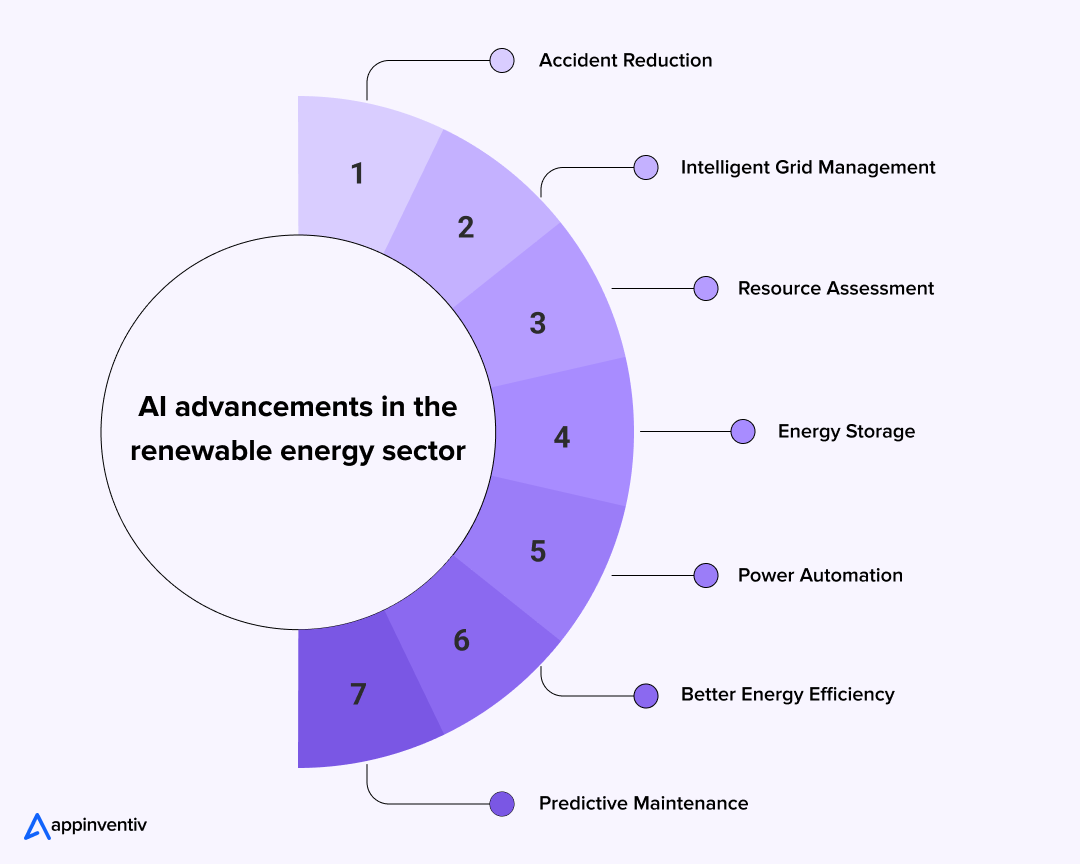
Empowering the Clean Energy Transition: As Australia moves towards a more sustainable energy future, managing the complexity of renewable energy sources is becoming crucial. An AI solution can maximize the efficiency of solar systems and batteries. A recent report from Biomass Producer highlights how AI is already being used to optimize smart grids and predict wind farm outputs in Australia, showing the technology’s real-world impact.
AI for Financial Fraud Detection and Analysis
The Idea: Create a fintech fraud detection software that uses machine learning to detect anomalous transactions and potential fraud in real time for banks and financial institutions. Unlike traditional rule-based systems, this AI would constantly learn from new data, allowing it to identify new and sophisticated fraud tactics as they emerge. This is a very compelling example among the many profitable business ideas for artificial intelligence.
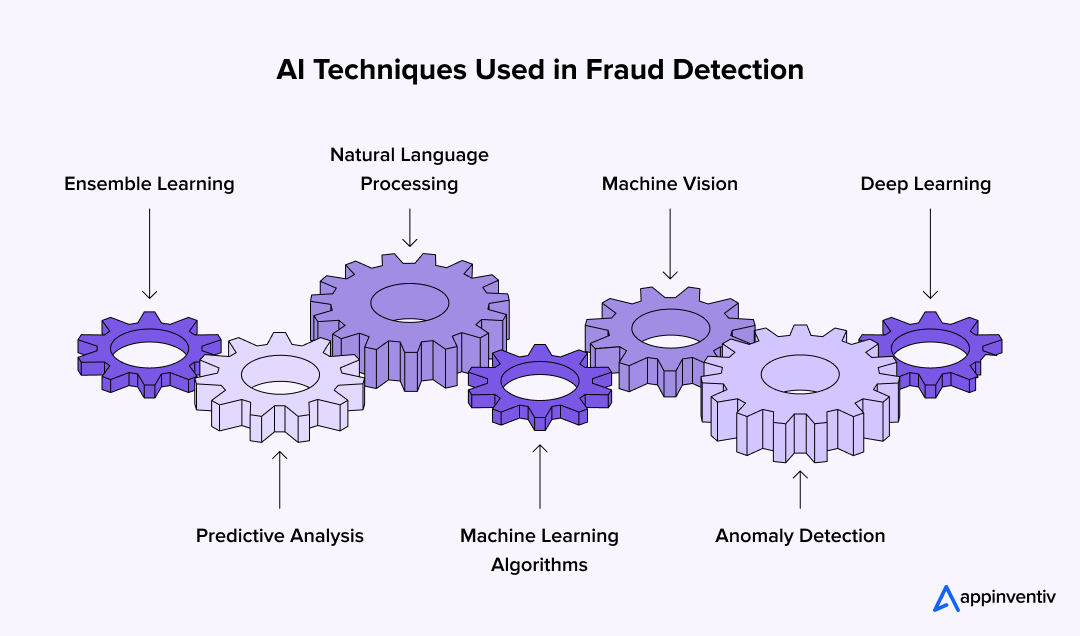
Securing the Financial System: Financial security is paramount for both businesses and consumers. By using AI to continuously monitor and learn from transaction data, financial institutions can stay one step ahead of fraudsters, protecting their customers and their bottom line. The Commonwealth Bank of Australia is a prime local example, widely known for its use of AI and machine learning to combat fraud and protect its customers.
AI-Powered Tutoring and Educational Platforms
The Idea: Launch an educational platform that uses AI to provide personalized learning paths and tutoring for Australian students, adapting to their individual pace and style. The AI based education could identify a student’s strengths and weaknesses and generate custom exercises, quizzes, and lessons to fill knowledge gaps. This is an impactful AI tech startup idea for Australian market, considering the need for better educational platforms focusing on interactive learning.
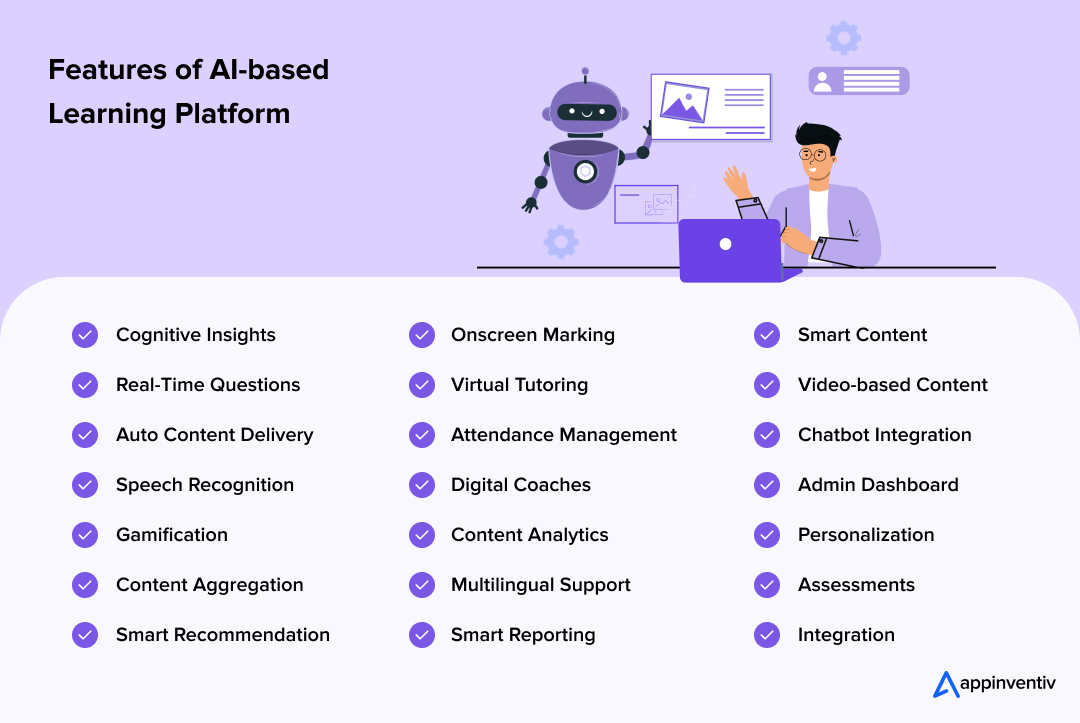
Personalizing Education at Scale: With increasing pressure on the education system, an AI-powered tutor can supplement classroom learning, provide a level of personalized attention that’s difficult to scale, and help bridge the gap in educational outcomes. Platforms like Eduaide.Ai and Mindgrasp are leading the way by offering tools that empower teachers to create personalized learning materials and help students learn more efficiently.
Bonus Read: Building AI Language Learning App (A Complete Guide)
You’ve got the ideas, now it’s time to execute. Discover how our AI development services can help you achieve your vision!
The AI Implementation Playbook: A Practical Guide for Australian Leaders
Business leaders see AI’s potential clearly, but the practical implementation of artificial intelligence business ideas remains unclear. This creates a major roadblock for entrepreneurs without big budgets. The smart approach means starting small and focused. Successful AI adoption begins with “micro innovation”—fixing one specific, valuable problem using targeted AI tools.
Here’s how to make AI business ideas in Brisbane and other cities actually work:
- Start with the Problem: Don’t look for fancy AI tools first. Find your biggest business pain instead. Are you losing customers? Shipping taking too long? Phone lines always busy? Figure out what’s really broken before you buy anything to fix it.
- Clean Up Your Data: AI only works if your data works. Check what information you have before building anything. Make sure it’s correct, organized, and easy to find. This boring work takes time but it’s the most important part.
- Start Small: Big AI projects can go wrong fast. Work with local companies or universities on tiny test projects first. See if the technology actually works and gives you good results without risking lots of money. What you learn here helps with bigger projects later.
Finding good AI people in Australia is tough, especially if you don’t have money for a full team. Instead of dealing with hiring and training headaches, getting another company to do your AI work might be your best choice. Working with a company like Appinventiv, which has people in Australia, gives you access to experts while you focus on growing your business.
Why Get Others to Do Your AI Work:
- Get Real Experts: Work with people who already know AI and can get things done.
- Focus on Your Business: Let AI specialists handle the tech stuff while you grow your company.
- Save Time and Money: Skip the long hiring process and training costs of building your own team.
When you outsource, you get the skills you need without the hassle of managing a tech team yourself.
Appinventiv developed Mudra, an AI-based budget management app that improved engagement by 40% and budgeting accuracy by 30%. Have a look at how we did it.
The Ethical Compass: Leading with Integrity in the Age of AI
AI adoption brings growing ethical and governance challenges. Business owners can’t treat this as just an IT department problem—it needs board-level attention. Ignoring ethics leads to damaged reputation, lawsuits, and lost customer trust. Dr. Catriona Wallace from the Responsible Metaverse Alliance says AI governance belongs at the heart of company strategy.
Business leaders can maintain integrity while building responsible AI practices. How? Let’s find out:
- Understanding Algorithmic Bias: AI learns from data. Biased data creates biased decisions. This matters most in hiring and lending decisions. Leaders need regular audits of their data and models to spot and fix bias problems.
- Protecting Data Privacy and Security: AI uses massive amounts of sensitive information. Australia’s Privacy Act controls how companies collect and use this data. AI business ideas in Perth and other cities need strong data protection systems to stay compliant and prevent breaches.
- Ensuring Transparency and Explainability: When AI approves loans or flags fraud, leaders must understand the reasoning. AI’s “black box” problem creates real risks. Transparency means explaining how AI reached its conclusions—crucial for responsible use.
- Defining Human-in-the-Loop: Automation helps, but humans must stay involved in important decisions. People review AI recommendations using empathy, context, and moral judgment that machines can’t match.
- Building Responsible AI Culture: Embed ethics throughout company culture from leadership down. Create clear guidelines, train employees regularly, and appoint ethics committees or officers, which is highly essential for anyone building an AI tech startup idea for Australian market 2025, focused on lasting success and trust.
Success requires mixing innovation with practical thinking. Exploring innovative Australian AI business ideas is just the start for new AI companies. Real success comes from smart execution. Perth, Sydney, Melbourne, Brisbane—every market is ready for change. You just need to begin.
Transform Your Australian Startup Vision of AI Innovation with Appinventiv
Forward-thinking entrepreneurs are transforming their operations through strategic AI implementation. Partnering with an established AI development company in Australia like us represents your pivotal business decision. Our team of 1,600+ technology experts brings a proven track record, delivering 3,000+ digital masterpieces since 2015. This experience establishes us as Australia’s premier AI development powerhouse.
Our AI expertise consistently transforms businesses across diverse sectors, earning trust from global leaders like the Americana Group and Flynas. Building on this foundation, our comprehensive AI development services encompass machine learning algorithms alongside generative AI solutions and intelligent automation systems. These integrated approaches streamline operations while driving exponential growth.
Appinventiv specializes in developing sophisticated AI-powered applications tailored to business needs. We build natural language processing systems, computer vision solutions, predictive analytics platforms, and chatbot integrations using advanced frameworks. Our technical capabilities span TensorFlow, PyTorch, and OpenAI APIs, complemented by custom neural network architectures. This comprehensive approach enables us to build intelligent solutions that adapt and evolve with your business requirements.
Why Choose Us for Your AI Journey:
Our seasoned AI strategists and developers work from ideation to deployment. We are known to leverage cutting-edge technologies to create intelligent solutions that automate mundane processes and enhance decision-making capabilities.
Contact Appinventiv today for consultation and discover how our AI services can accelerate your business growth by 10x.
Frequently Asked Questions (FAQs)
Q. What Are the Best AI Business Ideas for Startups in Australia?
A. Several top AI business ideas in Australia show promise for Australian startups. These include AI-powered AgriTech, FinTech solutions, MedTech innovations, AI-driven Cybersecurity, and AI-based EdTech platforms.
Q. Are AI Startups Profitable in Australia?
A. AI startups in Australia prove profitable indeed. Several companies achieve significant growth and attract substantial investment. Heidi Health serves as a prime example. This AI-powered medical scribe platform secured over AUD $16 million in Series A funding and supports over two million patient interactions weekly. This highlights both scalability and market demand effectively.
Splose offers another success story. This practice management software serves allied health professionals specifically. The company raised $5 million successfully and boasts a customer base exceeding 15,000 across multiple countries.
These examples underscore the profitability potential for AI startups in Australia. Companies addressing specific industry needs with innovative solutions show particular promise.
Q. Which Industries in Australia Are Best Suited for AI-based startups?
A. Australia has several good areas for starting AI businesses. Farming is a big one – AI can help farmers use smart tools, sensors, and satellite pictures to grow crops better. Healthcare is another good area where AI can help with paperwork and create health plans that fit each person.
Banks and finance companies can use AI to study data, catch fraud, and give customers what they need. Stores can use AI to manage what they have in stock and help customers better. And with more cyber attacks happening, security companies really need AI to fight off new threats. All these areas have good chances for AI businesses to succeed in Australia.
Q. How Much Does It Cost to Start an AI Business in Australia?
A. Starting an AI business in Australia costs around AUD 50,000 to AUD 250,000 for an MVP, covering basic AI features and development work. Enterprise-level AI solutions demand higher investment, ranging from AUD 150,000 to AUD 1,200,000, as advanced models drive these expenses up. Data processing requirements and infrastructure needs also factor into pricing.
Several elements influence final costs, with complexity playing a crucial role. Technology stack choices matter greatly, while the development team’s expertise affects pricing substantially. Long-term scalability requires additional planning alongside ongoing maintenance expenses that need consideration. Operational costs continue after initial development, meaning these factors collectively impact total investment requirements.
Q. What Government Support or Funding Is Available for AI Startups in Australia?
A. Australia provides several government programs supporting AI startups, with the AI Adopt Program giving grants to SMEs that help integrate AI technologies effectively. The AI and Digital Capability Centres Grants offer different funding opportunities, creating centres that support AI adoption nationwide. Google for Startups Accelerator: AI First (Australia) brings additional benefits where startups receive technical training through this program, alongside cloud credits and industry access that open new doors for participants.
These initiatives serve multiple purposes by helping startups grow systematically while making AI innovation adoption more accessible. Consequently, businesses can scale their operations more effectively through these comprehensive support mechanisms.
Q. How Can I Validate My AI Business Idea in Australia?
A. Market research helps validate your AI business idea in Australia by starting with careful identification of demand for your solution. Potential customers provide valuable insights through multiple channels, where surveys work well for broad feedback collection while interviews offer deeper understanding opportunities. Focus groups reveal pain points effectively before considering your next step.
Launch a minimum viable product that tests your idea’s core functionality thoroughly, as this approach validates concepts before major investment. Industry experts bring essential guidance to startups through AI-focused startup accelerators that offer structured support programs. Collaboration with these resources proves invaluable for comprehensive business validation.
Business
How AI Can Support Healthcare Supply Chains With Predictive Tools

Archie Mayani is the chief product officer at GHX, a global supply chain company that uses data and cloud-based technologies to connect healthcare providers like hospital systems and their suppliers.
For more than 20 years, Mayani has worked on clinical and supply-chain health technologies at companies like Change Healthcare and United Health Group.
At GHX, Mayani works to ensure that the company develops technology that can help hospitals procure patient supplies — like implants and IV fluids — as seamlessly as possible. By using AI-powered technologies that can anticipate supply chain disruptions, prioritize them in order of most critical, and identify substitutions, hospitals can be better equipped to provide effective patient care.
Business Insider interviewed Mayani about what sets healthcare apart from other industries when it comes to AI implementation.
This interview has been edited for length and clarity.
Rachel Somerstein: How is healthcare unique as an industry, particularly when we think about the integration of AI?
Archie Mayani: I’m based in Silicon Valley, where everybody wants to fail fast and move forward. But healthcare is very different from other sectors using AI.
When you are building a dating app and your AI hallucinates, it’s kind of funny and makes a great first-date story. When you have a patient on the operating table and you don’t have the right supplies delivered at the right time, it’s scary.
Can you talk about the goals of AI implementation in healthcare supply chain management?
Healthcare is about patient safety and how you use technologies responsibly, always putting the patient in the center. When we think about supply chain management, it’s almost like an invisible operating system in this shared ecosystem of patient care and delivery.
GHX’s mission with AI implementation revolves around delivering the right supplies at the right time to improve the quality of care and make it more affordable.
How did you arrive where you are now?
We have been leveraging AI and machine learning for the last 15 years. A lot of our work during the pandemic involved making supply disruptions more visible, with the goal of making supply chains more resilient and proactive.
One of the most important cases we thought about, coming fresh off the pandemic, was, “Can we look at backorder anticipation?”
It doesn’t matter what the cause is — it can be geopolitical conflict or meteorological tragedies. It could be that a trailer was dislodged and now we’ve lost the supplies on the freeway. But if we can anticipate back orders, we can anticipate disruption.
If the system is intelligent enough, it could recommend nearby substitutes within your distributed area. We started there, on a path of, “We’re going to build this machine-learning model that’s going to be intelligent, anticipate these disruptions, and make substitution recommendations.”
Where is AI in supply chain management working best right now?
We have an agile development approach at GHX, where our customers give us live feedback. We had an “aha” moment from our customers: They said, “This is absolutely what we’ve asked for for the past 20 years. You are starting to predict all of these disruptions, but the disruption of a Band-Aid is not the same as a disruption of IV fluid.”
They asked, “Can you make this technology even more intelligent for what I need, depending on where I think my most critical risks are and what kind of care delivery is most important to my organization?”
So we came up with the idea of clinical sensitivity and a confidence score, essentially to validate whether disruptions are clinically relevant to specific customers.
That was one of the things that changed the trajectory of our AI implementation road map: Just because we can deliver insights doesn’t make them useful; they have to be predictive and personalized.
What does the future of AI in healthcare supply chain management look like?
Since healthcare is different and unique from other industries, our approach is to automate workflows as much as possible using agents while keeping a human in the loop. Once the customer feels confident, we can start fully abstracting those workflows so that AI agents are handling them entirely.
The other place gaining traction is copilot environments. For example, we have a product called the perfect order dashboard, which marries data insights. A customer may say, “Show me the view of my world, of where the supplies are, of where I’m doing an exceptional job with my suppliers getting those supplies on time, making sure that the orders and invoices are paid on time, and show me all of the discrepancies.” Still, that’s not enough.
The copilot allows you to tell a story with that data, very similar to a ChatGPT-like experience: “Show me the top three defaulting suppliers not delivering supplies on time.”
Once you have those supplier lists generated, you can say, “Send an email to XYZ supplier, making sure we have a quarterly business review scheduled, and please attach the perfect order dashboard view showing the last quarter’s trend.”
It might seem small, but it’s a huge value-add. It used to take maybe three or four hours to understand the data, extract insights, and drive follow-up actions and decisions. Now, it takes minutes.
What advice do you have for others in your position or who hope to be?
The hardest or most useful thing you can do is to say no.
In healthcare, everything is urgent — and it truly is. But not everything matters equally. So, the ability to say no to the right things and ensure that you’re focusing on the highest value-added items for your customers is critical when you’re in healthcare.
Big Tech, or even a smaller tech startup, can innovate as research labs and fail. We don’t have that option. So understanding what matters now, what will matter in 10 years, and finding the right balance to focus on the right innovations, becomes critical.
It’s about having the right data, the right governance and mechanisms, and always thinking about performance, security, and privacy. It’s also about making responsible choices on where to invest your energy, so that you’re ultimately not working on the sexiest, coolest, or hardest things.
It comes back to the patient: making care affordable and of the highest quality possible.
Business
The AI Message From Silicon Valley: ‘No One’s Slowing Down’

After a busy day at the Goldman Sachs tech conference earlier this week, I sat down with the firm’s internet analyst Eric Sheridan to take stock. His main takeaway: “No one’s slowing down.”
Despite spending massively on AI infrastructure, almost every tech exec told him AI demand is outstripping their ability to supply intelligence, he said.
This was summed up by executives at CoreWeave, which builds and runs AI data centers. “Unrelenting,” they said, while noting there’s been yet another upward inflection in AI demand in the past four to six weeks.
During the dot-com boom of the late ’90s, internet infrastructure was built out massively based on eyeballs — just the fact that people were looking at websites. This time, there’s actual revenue from consumers and companies paying for AI services, Sheridan noted.
The conference headliner was OpenAI CFO Sarah Friar. The room was packed for her talk. Even the overflow room was full, with many analysts and investors sitting on the floor. I’ve never seen so many loafers and crossed legs at the same time.
Mike Segar/REUTERS
OpenAI is on course to generate $13 billion in revenue this year, but the company is “still massively compute constrained,” she said. That leads to tough decisions such as holding back new products, running some services intentionally slower, and having to choose which research projects get resources and which ones must wait.
This situation is also creating “strange bedfellows,” Sheridan told me. At the Goldman conference, Meta CFO Susan Li said the tech giant is working with Google, an arch rival. Friar mentioned OpenAI is also tapping Google’s cloud for capacity. Those two are going to the mat over the AI search market.
One dark cloud
The only dark cloud at the Goldman conference: Software could be disrupted by AI and that’s weighing on shares of SaaS providers. Friar was asked about this and she didn’t hold back.
In the new world of autonomous software development, it’s now easier to create bespoke software in-house. “Why wouldn’t I code the kind of software that is exactly what OpenAI needs,” the CFO said. “That is going to change the whole face of how software is developed.”
I felt a shudder ripple across the room as attendees considered how much of the world AI might consume in the coming years.
“Short everything,” someone muttered beside me as the audience got up to leave. Analysts laughed nervously as we filed out in a long, slow line.
Sign up for BI’s Tech Memo newsletter here. Reach out to me via email at abarr@businessinsider.com.
Business
Bergquist appoints directors of business automation and AI, marketing

Bergquist Inc. is strengthening its customer support with the addition of Trevor Brewster as director of business automation and AI, a newly created role, and Natalya Zaytseva as director of marketing.
Brewster has spent more than two decades working in entrepreneurship, business management and customer service related roles, with a foundation in technology and finance.
In his new role, Brewster will identify opportunities where automation and AI streamline workflows and reduce repetitive tasks, allowing employees to focus on customer support. This work will include the implementation of tools designed to centralize product information and preserve institutional knowledge to enhance efficiency and responsiveness to customer service.
“I’m excited to join Bergquist at such a pivotal time,” says Brewster. “By bringing automation and AI into the organization’s daily operations, we can simplify complex processes, reduce manual tasks and ultimately serve our customers faster and more effectively. These innovations aren’t about replacing people; they’re about giving our team the tools to focus on what matters most, building stronger relationships with our customers.”

Zaytseva has over two decades of marketing leadership experience, previously serving as marketing director at Crystal Flash Energy and head of marketing operations at Merlin. In her previous role as Americas marketing director at X-Rite Pantone, Zaytseva developed and executed regional commercialization strategies, strengthening lead generation and inside sales functions to achieve the company’s growth goals.
“This is an amazing opportunity to be part of a company that is truly committed to its customers and the industry,” says Zaytseva. “I look forward to applying my experience in marketing and in the energy industry to expand Bergquist’s already-strong brand presence, connect more meaningfully with our customers and ensure our strategies directly support their goals as well as the company’s long-term vision.”
In her new role, Zaytseva will be responsible for advancing Bergquist’s marketing strategy, focusing on expanding brand visibility, deepening customer relationships and aligning market initiatives with business development goals.
“These appointments reflect our commitment to continuous innovation and our focus on providing customers with the best possible experience,” says Lauren Clark, Bergquist CEO. “With Trevor spearheading automation and AI initiatives, and Natalya shaping our marketing vision, we are further strengthening our ability to anticipate customer needs and deliver meaningful solutions that help them grow their businesses. These appointments underscore our mission to combine innovation with expertise, ensuring that our customers have the tools, resources and support they need to succeed.”
-

 Business2 weeks ago
Business2 weeks agoThe Guardian view on Trump and the Fed: independence is no substitute for accountability | Editorial
-
Tools & Platforms1 month ago
Building Trust in Military AI Starts with Opening the Black Box – War on the Rocks
-

 Ethics & Policy2 months ago
Ethics & Policy2 months agoSDAIA Supports Saudi Arabia’s Leadership in Shaping Global AI Ethics, Policy, and Research – وكالة الأنباء السعودية
-

 Events & Conferences4 months ago
Events & Conferences4 months agoJourney to 1000 models: Scaling Instagram’s recommendation system
-

 Jobs & Careers2 months ago
Jobs & Careers2 months agoMumbai-based Perplexity Alternative Has 60k+ Users Without Funding
-

 Podcasts & Talks2 months ago
Podcasts & Talks2 months agoHappy 4th of July! 🎆 Made with Veo 3 in Gemini
-

 Education2 months ago
Education2 months agoMacron says UK and France have duty to tackle illegal migration ‘with humanity, solidarity and firmness’ – UK politics live | Politics
-

 Education2 months ago
Education2 months agoVEX Robotics launches AI-powered classroom robotics system
-

 Funding & Business2 months ago
Funding & Business2 months agoKayak and Expedia race to build AI travel agents that turn social posts into itineraries
-

 Podcasts & Talks2 months ago
Podcasts & Talks2 months agoOpenAI 🤝 @teamganassi


